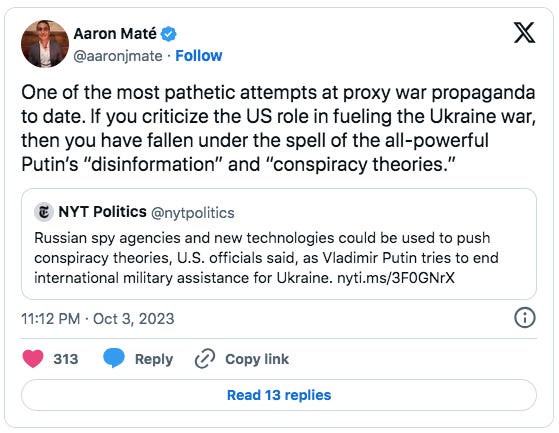American State Propaganda: A Thought Experiment

Listen to a reading of this article (reading by Tim Foley):
The New York Times has published another CIA press release disguised as news, this time aimed at whipping up paranoia toward anyone who criticizes the US proxy war in Ukraine.
The article is titled “Putin’s Next Target: U.S. Support for Ukraine, Officials Say”. Its author, Julian E Barnes, has written so many New York Times articles with headlines ending in the words “Officials Say” that we can safely assume the primary reason for his continued employment in that paper is because empire managers within the US government have designated him someone who can be trusted to print what they want printed. This designation would make him a reliable supplier of “scoops” (read: regurgitations of unevidenced government claims) for The New York Times.
“American officials said they are convinced that Mr. Putin intends to try to end U.S. and European support for Ukraine by using his spy agencies to push propaganda supporting pro-Russian political parties and by stoking conspiracy theories with new technologies,” Barnes writes.
Of course the report never gets any more specific than that, and of course the “American officials” Barnes cites promote their unevidenced assertions under cover of complete anonymity.
“The American officials spoke on the condition their names not be reported so they could discuss sensitive intelligence,” Barnes writes.
The only named source cited in the article is a CIA veteran named Beth Sanner, who says that “Russia will not give up on disinformation campaigns,” but adds that “we don’t know what it is going to look like.”
And that’s really the whole article right there. Putin is going to be using his spy agencies to promote political parties and messages which support ending the practice of pouring billions of dollars of weapons into Ukraine, but nobody knows what that will look like exactly, so we all have to just be sort of generally distrustful toward anyone who doesn’t think it’s a swell idea to perpetuate a horrific war with potentially world-ending consequences, because they might be part of an unspecified Russian influence operation.
We saw a similar report from CNN a few weeks ago, in which the public was warned that Russia’s FSB is working to convert westerners into mouthpieces for Russian propaganda using methods so sneaky and subtle that those westerners wouldn’t even know it’s happening. Again, details were extremely vague and the only obvious response to the information provided is for everyone to just get really paranoid toward anyone saying anything that doesn’t support current US foreign policy toward Russia.
As a thought experiment, imagine what it would look like if the CIA or some other agency wanted to advance US information interests by making the public distrustful of any people or information which go against US strategic objectives. Try to imagine some of the things they might say or do.
Do you imagine it would look much different than what we’re seeing currently? Feeding trusted mainstream news reporters extremely vague stories about the Kremlin trying to deceive people into opposing the longstanding agendas of the US intelligence cartel, using online media and social subversion? Can you think of a more effective way to help shore up trust in your preferred narratives and sow distrust in narratives you do not prefer?
Here’s another one: imagine a state media outlet for a tyrannical dictatorship. Think about how its news stories are made, how it would often take orders from the government on what to report and what not to report, and how all its printing or broadcasting would always align with the information interests of that government.
Now ask yourself: in what material way is that reporting different from these CIA press releases we’re seeing from outlets like The New York Times and CNN? In both scenarios the government is feeding the media information it wants printed, and in both scenarios there will be consequences if the media don’t obey. In our hypothetical dictatorship those consequences might be more severe, but in our real life scenario the consequences are no less real.
If Mr Barnes had refused to work on this story, he would have lost his “scoop” and it would have been given to someone else, perhaps at a competing outlet. If Barnes ceased uncritically reporting unevidenced assertions from anonymous government officials, his prominence in the mainstream media would quickly fizzle, and his career would dry up. If The New York Times ceased functioning as a reliable outlet for the credulous printing of unevidenced government claims, then the government agencies who’ve been elevating the paper to prominence with their artificial “scoops” can take those hot stories to another competing outlet and let them get the subscriptions and the glory.
In both scenarios, the government is able to get its propaganda messaging printed as hard news reporting. In one scenario the reporter reports what the government wants because they work for the government, in the other scenario the reporter reports what the government wants because that’s the only way to have a career in media outlets that are owned and controlled by the plutocrats who benefit from the political status quo the government is premised upon. The only major difference is that in our hypothetical dictatorship, the public probably knows it’s being fed propaganda, and is therefore more likely to take what they’re being told with a grain of salt.
In a tyrannical dictatorship, the press is operated by employees of the government. In a Free Democracy™️, the press is operated by employees of the oligarchs who operate the government. In both cases you’re getting state propaganda, but in one of them the propaganda is disguised as objective news reporting.
https://www.caitlinjohnst.one/p/american-state-propaganda-a-thought
 TheAltWorld
TheAltWorld 

0 thoughts on “American State Propaganda: A Thought Experiment”